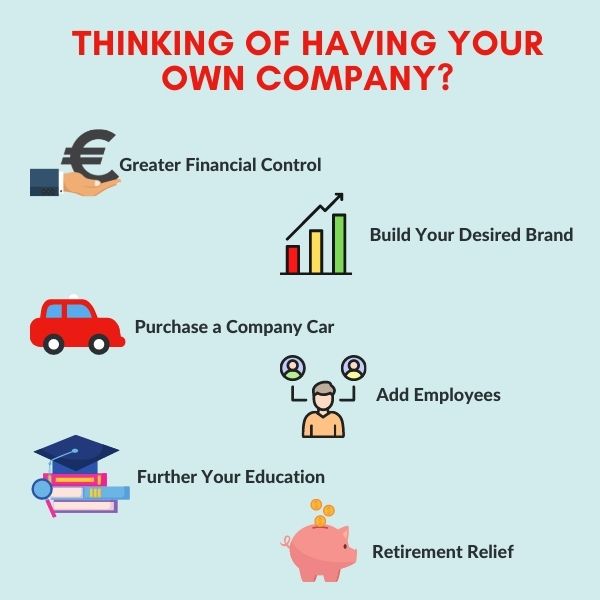Is it Time to Have Your Own Company?

By Joanne McGrath PLC Manager Contracting PLUS
Is Now the Right Time to Consider Having Your Own Company?
If you have been Contracting for a while and are starting to think about Professional Contracting as part of a longer-term career plan (at least for the next 3 – 5 years) it may benefit you to have your own Personal Limited Company. Being a director of your own Company allows you to have more control over your finances, along with several other tax benefits and gives you some longer-term options to consider like Retirement Relief (where you can extract up to €750,000 tax free from your company) or Entrepreneur Relief which allows for a Capital Gains Tax rate of just 10% (normally 33%).
If you are thinking about having your own Company – commonly referred to as a Personal Limited Company, talk to your Dedicated Account Manager in Contracting PLUS. Changing over is straightforward and there is no additional expense incurred with Contracting Plus.
The Definition of a Personal Limited Company
A Private Limited Company is also known as a separate legal entity, which gives you limited liability personally. Typically, you will be the 100% owner of a Private Limited Company. However, Contractors sometimes give a shareholding to a spouse/partner or business colleague. This is useful if you want to operate a single business unit and if they have complimentary skills. You still operate as individual Contractors but using the Limited Company as your legal business structure.
How it Works for You as a Professional Contractor
Your company now invoices the client you work for and the money is paid into the Company bank account. The Company owns this money. The Company then uses this money for things such as purchasing Company Vehicles, paying you a salary, making pension contributions on your behalf and reimbursing you for business expenses you have incurred.
Benefits of a Personal Limited Company
1. Buying a Company Car
The initial outlay to purchase the vehicle and all related expenses will go through your Limited Company. All expenses that relate to the vehicle will be paid by the company which makes it tax efficient. Examples would be tolls, repairs, insurance, motor tax, etc. We recommend either a commercial vehicle or a full electric car. With a commercial vehicle there is BIK (benefit in kind tax) of 5% of the original market value. An electric car has no BIK where the cost of the car new was less than €50,000.
Example
• OMV of Vehicle €20,000
• BIK of 5% €1,000
• You are then liable to pay tax on the €1,000 over the course of 12 months.
Currently, there is no BIK on an Electric Vehicle. If you are incurring substantial business mileage- for instance greater than 40,000 kms per year, a regular petrol/diesel/hybrid car may be an option for you also. However, without high business mileage the BIK tax of up to 30% makes this an unattractive option.
2. Building Your Brand
A great brand can help you stand out from the crowd. With your own Company you have control over the name of the Company and how you want to market it. If you are looking to create a website, then it can be easier when you have control of these elements.
3. Employing a Team Member
If you are being supported in your business by your Spouse/Partner, you may decide to pay them a salary. They may be assisting you with administrative, marketing, or general business duties. It is important that their salary is in line with duties they carry out. By employing a family member, you may be able to save up to €6,000 in taxes each year.
4. Engaging Subcontractors
If you are growing your business and have a number of contracts that require other Professional Contractors, you may want to engage Sub-Contractors. You may do this through your own company, and this is a more tax efficient option than employing people to work through your company. You are also protected from the responsibilities associated with being an Employer – Holiday Pay, Employers PRSI, Bank Holiday Pay, Pension, etc.
5. Various Business Interests
In today’s business environment, there are many opportunities available to us all. You may decide to invest in cryptocurrency or increase your capacity to generate another income for your Company by selling products through an e-commerce platform. The administration of these can be easier when you have your own company.
6. Further Education
To grow your business, you may need to further your education. You might consider completing a PHD, Masters, or some other courses which will allow you to broaden your skills. With your own limited company, you may be able to claim the cost of further education as an expense of the company.
7. Planning for Retirement
If you are heading towards Retirement in the next number of years, you may be in a position where you don’t require your full salary each month. If this is the case, it may be beneficial for you to build up funds in your company and to then plan the most tax efficient way to withdraw these at a later date. This may be done through Retirement Relief or Entrepreneur Relief. With Retirement Relief, if you meet the conditions, you may end up paying taxes of 19.5% as opposed to 52%. With Entrepreneurs Relief, you may be able to take a lump sum out of your business, again there are some terms and conditions attached but we will be happy to go through these with you.
Having your own company is not complicated, it’s free and your Dedicated Account Manager will manage the set-up for you. Remember, there are some great financial benefits to be had. As always, if you have questions we will be happy to discuss these with you and advise on whether we believe your personal financial situation could be improved by setting up your own company.
Why not have the conversation and see where you stand. At Contracting PLUS we want all our Professional Contractors to get the best financial outcome from their Contracting career and are eager to help you achieve that.
Contracting PLUS – Making Contracting Simple
See related articles

